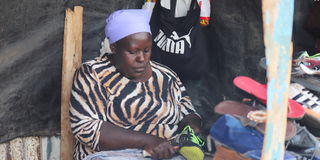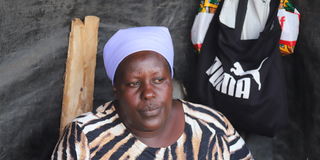Nakuru woman defies religion, husband's critique, in pursuit of financial freedom

43 year old Monica Wanjiku repairing shoes at her shop in Free Area on November 19,2025.
In Free Area, between buzzing kiosks, motorbike repair stalls, and vegetable vendors, sits a small iron-sheet workshop where the steady sound of a hammer striking leather fills the air.
Inside, 43-year-old Monica Wanjiku works quietly, her hands moving with the calm confidence of someone who has shaped her life through determination and skill.
Wanjiku is a cobbler repairing torn shoes and sewing new ones, and restoring worn-out soles.
“I sew, repair and make new shoes. This job has fed and educated my children, “she says proudly.
Her journey began long before she came to Free Area. At 20 years old, she learned shoe-making from a local fundi in Kuresoi , paying him sh 10,000 she had saved through the small money her husband had been giving her to run the house.
Wanjiku is however quick to say she had to do all her learning in secret because of her husband instead of her being a housewife and not working at all.
“The fundi taught me well; I would have my two to three-hour lesson and go back home. And in one year I had learnt the skill perfectly. By 21, I knew this would be my life’s work,” she recalls, saying she loved the job because it did not have many women at the time.
She opened her first workshop in Kuresoi after purchasing tools worth sh 1,000 to kick off her career, where her skill quickly drew customers.
Her first client, surprised to see a woman doing cobbler work, became so impressed that he returned with more people.
“He was very happy with the service I offered him. He needs a pair of male sharp shooter shoes and he liked the shoe I made. He got me more referral customers,” Wanjiku explains.
However this joy did not last long, as Wanjiku’s clientele grew bigger so did her marriage get sore.
Her husband did not appreciate her serving a great number of men at her job.
She once had to ask her husband to work alongside her because he was also a cobbler, though their shared trade sometimes caused tension.

43 year-old Monica Wanjiku a cobbler at Free Area poses for a photo during an interview on November 19,2025.
“He would get angry when my customers were male. Eventually the marriage failed from constraints because of my work,” she says, noting she had to fight for her place in society as a working woman.
But everything changed in 2007, when the post-election clashes forced Wanjiku and her family to flee.
“I came to Free Area as a refugee. I had lost everything, my house, my stock, everything I had worked for,” She recounts.
In Nakuru, she started again from zero, supported by a female friend who asked her to come and take what she needed to start work. The lady promised her she could Pay her later and that’s how she rebuilt her life.
Wanjiku rented a small space in Free Area for Sh 300 per month, bought basic tools, and slowly re-established her customer base.
Today, she buys leather in Nakuru city center from as low as Sh 400 and sells finished school shoes for Sh 650.
The mother of nine says on a busy month, especially during school reopening, she earns between Sh 500 and Sh 4000.
She notes biggest challenge is customers who take shoes for repair and delay picking them. This forces her to find a place to store them.
Some even take her to the chief if they miss a shoe a client comes to pick months or years later. But despite these struggles, Wanjiku remains grounded and focused.
“I have nine children. They eat because of this job. They study because of this job.” She says, while appreciating her Akorino religion for supporting her to do this job.
Wanjiku’s day begins at dawn, preparing her children, finishing house chores, and opening the shop by 8:30 am to 7 pm.
To women who believe they have no opportunities, Wanjiku has a simple message; “Stop staying in the house. There are many jobs, you can start small and build from somewhere,” she notes
Despite her experience, Wanjiku still dreams of something more. She would love to go back to school and learn to be a clothes tailor.
“Sewing custom made clothes has been my dream and I hope to one day achieve it,” she concludes.
